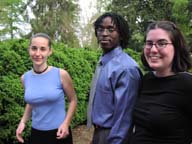Welcome to the first Senate meeting that I’ve led. If I mess up, please don’t yell and scream at me.” With those words, Senate President Abdul-Qawiy “AQ” Abdul-Karim opened the first meeting of the 2004-2005 Guilford College Community Senate.
Approximately 15 students attended the April 14 meeting, including former Senate President Floyd McKissick. The meeting began with a moment of silence, moving into an overview of the agenda.
As in most Senate meetings, the first order of business was budgetary.
Abdul-Karim explained that Senate was already planning its budget for next year, and was seeking input from the student body at large. “The sky’s the limit for what we can do with these funds. If (Guilford students) want to lay the foundation for an outdoor amphitheater with this money, then that’s what we’ll do.”
After a slew of hands were raised to give suggestions for the fund’s uses, Abdul-Karim said, “I think we can do without the hand raising. We’re all adults here. Let’s just talk.”
The ideas came quickly, each one sparking discussion among the group.
Suggestions ranged from organizations that Senate could fund, such as a research fellowship for science students and a Get Out the Vote drive, to physical campus improvements, such as a bench for the Bryan Quad, a spice garden in front of Founders, and a co-op building.
Several people also suggested ways for Senate to be more in-tune with what the student body wants, ranging from a suggestion box in the Founders Lobby to a column in The Guilfordian.
Abdul-Karim urged students to get in contact with professors who may have drawn up plans for such projects but put them on hold due to lack of funding. “Use your networking skills,” he said.
The second half of the meeting was devoted to the resignation of Rebecca Saunders, former Director of Student Life and Leadership and faculty advisor to Senate.
Abdul-Karim explained the situation to the best of his knowledge.
“On Monday, Rebecca had a meeting with [Dean for Campus Life] Anne Lundquist where, in my understanding, she was given the opportunity to be fired, or resign. She chose to resign.”
Lundquist attended the meeting and acknowledged that while the amount of information she could give to students was limited by confidentiality agreements, she would answer students’ questions to the best of her ability and knowledge.
One such question asked about the timing of Saunders’ resignation, three weeks from the end of the school year and during a time when many student organizations required Saunders’ aid for financial planning.
Lundquist responded by outlining the numerous procedures taken before an employee is asked to leave, before adding that sometimes “there are things for which someone can be asked to leave immediately.”
Lundquist recognized the relationship that Saunders had with the students, and promised “no [hiring] decision will be made over the summer without interviewing students. If I have to bring students back (to campus) to interview people, then I will bring students back to interview people.”
The meeting ended on a note of promised student involvement. Hatice Dogan said, “Here we are sitting and talking about working together. But we can’t just sit and talk: we’ve got to start working together.”
Secretary Alexandra Stewart agreed, saying, “There’s a lot of momentum that’s built up, and I hope that Senate will be a vehicle that will … keep (that momentum) going.”
Student reactions to the 2004 senators were positive. Stephen Watkins said, “(they were) very good at creating a structure that could be used for students to interact effectively with the administration.”
The officers were optimistic as well. When Abdul-Karim was asked for his feelings about the meeting, he smiled and said, “I think we took some steps, but we need more people. I want to see 150 people here next week.”
Stewart was also enthusiastic, saying, “I’m pleased … It’s very promising to see students involved.
Categories:
A first look at Senate 2004-2005
Matt Haselton
•
April 22, 2004

With Chris Lett still abroad in Ghana, Laura Wigand, Abdul-Qawiy “AQ” Abdul-Karim, and Ali Stewart (from left to right) are tackling their duties as incoming Senate executives with 3/4 of their ticket and a smile (Matt Haselton/Guilfordian)
0
More to Discover
